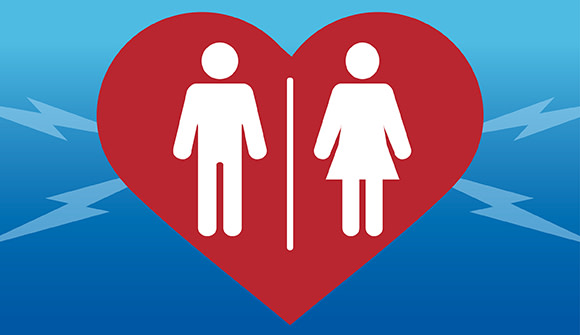In sickness and in health
Study finds marriage may protect couples from heart disease.
Article Author: Katie McPherson
Article Date:

A recent study by the University of Keele and Academic Department of Cardiology at Royal Stoke Hospital in the United Kingdom found that people who are married appear to have a lower risk of heart disease. They analyzed data from 30 studies involving more than two million people, finding that those who weren’t married were at a 42 percent higher risk of developing cardiovascular disease and a 16 percent higher risk of developing coronary artery disease compared to married people.
Coronary artery disease refers to narrowing of the arteries due to cholesterol deposits, and cardiovascular disease includes events like heart attack, heart failure, arrhythmias (heart rhythm disorders) and cardiomyopathy (enlarged or rigid heart).
While the majority of a person’s risk for cardiovascular disease is caused by factors like genetics, high blood pressure or diabetes, researchers believe other factors like social networks or relationships also play a role in prevention.
All you need is love
Houston Mooney, MD, a cardiologist with Baptist Heart Specialists at Baptist Medical Center Nassau, says that while this study may show marriage is great for prevention of heart disease, it’s hard to pinpoint exactly why.
“With data like these, causality is difficult to determine,” he said, referencing the many reasons a romantic partnership may boost heart health. The study’s researchers believe it may be because spouses hold each other accountable for their health and wellness. Dr. Mooney agrees.
“Lifestyle changes are easier to make if you have someone who is trying to make those changes with you,” he explained. “Couples in relationships may be more likely to eat at home, with planned, balanced meals rather than eating less healthy, on-the-go options. They’re more likely to have children and, with such responsibility, many people find the determination to quit smoking or moderate their alcohol consumption in order better fulfill their parental duties and to keep from exposing their children to a potentially harmful environment.”
Living together also means one partner is able to respond more rapidly to a heart-related crisis when it strikes the other.
“We do know that in events where patients suffer cardiac arrest, massive heart attacks or fatal arrhythmias, unwitnessed events have a much worse prognosis,” said Dr. Mooney. “The key factor to survival in cardiac arrest is minimizing the time to effective CPR and, if needed, defibrillation (administering a controlled electric shock to restore normal heart rhythm). When an emergency event is witnessed, the times to treatment is typically much shorter.”

Dr. Mooney adds that dual incomes in a marriage or domestic partnership may mean better access to health care, preventive care, and healthy diet and exercise options.
“In my mind, with more money comes health insurance, the ability to afford medications and the ability to seek second opinions. Also, healthy food options can often be more expensive. Patients with means can afford gym memberships, personal trainers and to take time off from work if their health is in crisis.”
So, marriage isn’t exactly a magic pill. The key to a heart-healthy relationship is having a partner who supports healthy lifestyle choices and reduces stress. Partners provide emotional support, which can help decrease stress and blood pressure. “Broken heart syndrome” is a temporary condition that resembles a heart attack and is induced by stress.
While the study only used data from married heterosexual couples, Dr. Mooney hypothesizes that couples of any sexual orientation and marital status would likely experience the same reduced risks of heart disease.
“Stress has detrimental effects on the body and it’s easy to assume that healthy relationships have less stress,” he said. “Cortisol is one of the primary stress hormones in the body, and it plays a role in the regulation of blood sugar and blood pressure, both of which are significant risk factors for heart disease. While there are some risk factors that have been shown to be specific to the LGBTQ community, I think that many benefits of a healthy relationship can apply to all types of partners.”
Single, separated or “It’s Complicated”
If marriage reduces the risk of heart disease, what about those who are divorced? The study found that divorced participants had a 35 percent higher risk of developing heart disease compared to married people.
“Solely based upon the numbers, it seems like any protective effect of marriage is nearly reversed by divorce,” Dr. Mooney said. “It seems logical that marriages that end in divorce are by nature unhealthy and thereby would not provide the benefits of a healthy relationship.”
However, those who are single need not rush to find a partner just for the sake of a healthy heart. Friends and family can be just as helpful for emotional support as a partner.
“I think the real focus should be on stress reduction and building community and accountability,” said Dr. Mooney. “I do think many of these benefits can apply to patients with good support systems.”
If you are concerned about your heart health, visit baptistjax.com/heart to find a cardiologist near you.
Marriage and heart disease study: heart.bmj.com/content/104/23/1937



